Ratings agency Fitch lowers China’s sovereign credit outlook to negative
Beijing says it is ‘disappointed’ with decision by US-based ratings agency.

Fitch Ratings has downgraded China’s sovereign credit outlook to negative, prompting pushback from Beijing.
The downgrade reflects “increasing risks to China’s public finance outlook” as the country attempts to move away from real estate-led growth, the New York-based ratings agency said on Wednesday.
Keep reading
list of 4 itemsHow Taiwan learned from the past to reduce the risk from earthquakes
Kashmir’s apple orchards, millions of jobs, face threat from rail line
US officials probe new whistleblower claims against Boeing
Fitch, one of the “big three” ratings agencies along with Moody’s and Standard & Poor’s, said it expected the government deficit to rise to 7.1 percent of gross domestic product (GDP) in 2024, up from 5.8 percent last year.
Government debt was forecast to rise to 61.3 percent of GDP this year, up from 56.1 percent in 2023.
“Wide fiscal deficits and rising government debt in recent years have eroded fiscal buffers from a ratings perspective,” Fitch said.
“Fitch believes that fiscal policy is increasingly likely to play an important role in supporting growth in the coming years which could keep debt on a steady upward trend.”
Fitch also pointed to liability risks in the future.
“We view fiscal risks as higher than suggested by official government debt metrics, given perceptions that certain government-related entities carry implicit government support,” it said.
China’s Ministry of Finance said it was “disappointed” with the decision.
“We had a lot of in-depth communication with Fitch’s rating team in the early stages, and the report partly reflected the views of the Chinese side,” the ministry said in a statement.
“However, judging from the results, the indicator system of Fitch’s sovereign credit rating methodology fails to effectively reflect, in a forward-looking manner, the positive effects of the fiscal policy of ‘moderately increasing the strength, improving the quality and efficiency’ on promoting economic growth and further stabilising the macro leverage ratio.”
China’s fiscal policy in the long run will help maintain good sovereign credit by “keeping deficit at an appropriate size, utilising proceeds from debt issuance to expand domestic demand, and supporting economic growth”, the ministry said.
“The Chinese government has always insisted on taking into account the multiple objectives of supporting economic development, preventing fiscal risks and realising fiscal sustainability. It has made scientific and reasonable arrangements for the size of deficits according to changes in the situation and the needs and possibilities and has kept the deficit rate at a reasonable level.”
Alicia Garcia Herrero, chief economist for Asia Pacific at Natixis in Hong Kong, said the downgrade reflected Fitch’s sensitivity to China’s “financial problems”.
“We know that 10 provinces have been asked to cut infrastructure spending. So the pressure is there quite clearly,” Garcia Herrero told Al Jazeera.
“That they’ve been asked to cut, although this is not good for growth, simply because there is no financial means for them to continue to invest in infrastructure.”
Fitch maintained China’s credit rating at A+, pointing to the country’s “large and diversified economy, still solid GDP growth prospects relative to peers, integral role in global goods trade, robust external finances, and reserve currency status of the yuan”.
China’s economy, the world’s second-largest, is grappling with slowing growth amid a host of headwinds, including a shrinking population, weak consumption, a prolonged real estate slump, and capital outflows.